- Home
- Alison Booth
The Philosopher's Daughters
The Philosopher's Daughters Read online
Praise for Alison Booth’s novels
THE PHILOSOPHER’S DAUGHTERS
‘A lyrical tale of wild frontier Australia. Evocative, insightful, thought-provoking’
Karen Viggers, best-selling author
‘Two young women in outback Australia in the 1890s, where the brilliant sunlight may illuminate more than the landscape. Booth is superb at the small detail that creates a life, and the large one that gives it meaning’
Marion Halligan, prize-winning novelist
‘A delicately handled historical drama with a theme of finding self, both in relationships and art’
Tom Flood, prize-winning novelist
A PERFECT MARRIAGE
‘With an intricate plaiting of past and present that both tantalises and beguiles, this novel is a poignant account of a marriage that is not what its title suggests’
Marion Halligan, prize-winning novelist
‘Alison Booth captures the magnificence of female friendships and the tragedy of a disastrous marriage in a narrative that has the most satisfying of conclusions, hope’
Nicole Alexander, best-selling author
‘With crystal-clear prose and an artful warmth, Alison Booth leads us into the heart of contemporary human relationships, exposing tough – and necessary – truths. Very moving’
Nigel Featherstone, author of Bodies of Men
‘… cleverly structured…’
Sydney Morning Herald
STILLWATER CREEK
A mythical town and its people are brought beautifully to life… a really lovely book’
Sunday Telegraph
‘A finely observed historical drama… evocative and eminently readable’
The Age
‘A story that lingers long in the imagination’
Debra Adelaide,
author of The Household Guide to Dying
‘Who could not be charmed by Stillwater Creek? I loved the characters, the scenery, the dramas, the gentle humour and the sense of Australia as it once was’
Good Reading
THE INDIGO SKY
‘A charming, big-hearted tale, told with skill and grace’
Madison
‘This charming follow-up… captures the heart and soul of a time… you can practically smell the eucalyptus, and picture that titular indigo sky’
Books + Publishing magazine
‘Alison Booth’s distinctive characters live in Jingera, a small fictional town on the coast of NSW… Booth puts steel into the charm by addressing the harsher realities of the times’
The Age
A DISTANT LAND
‘A Distant Land is part-thriller, part-romance, and… I found myself engrossed in the drama of Zidra’s investigation into corruption in internal security and of the aftermath of Jim’s South-East Asian ordeal, all the way to the final page’
The Canberra Times
‘A Distant Land is a moving story of love set against the backdrop of the Vietnam War’
Aussie Reviews
Other fiction titles by Alison Booth:
Stillwater Creek
The Indigo Sky
A Distant Land
A Perfect Marriage
The
Philosopher’s
Daughters
Alison Booth
Published by RedDoor
www.reddoorpress.co.uk
© 2020 Alison Booth
The right of Alison Booth to be identified as author of this Work has been asserted by her in accordance with sections 77 and 78 of the Copyright, Designs and Patents Act 1988
All rights reserved. No part of this publication may be reproduced, stored in a retrieval system, copied in any form or by any means, electronic, mechanical, photocopying, recording or otherwise transmitted without written permission from the author
A CIP catalogue record for this book is available from the British Library
Cover design: Emily Caudelle
Typesetting: Fuzzy Flamingo
www.fuzzyflamingo.co.uk
For my family
On ne découvre pas de terre nouvelle sans consentir à perdre de vue, d’abord et longtemps, tout rivage.
One does not discover new lands without consenting to lose sight, for a very long time, of the shore.
André Gide (1925)
The Counterfeiters (Les faux-monnayeurs)
Contents
Praise for Alison Booth’s novels3
Contents13
Chapter 116
Chapter 224
Chapter 329
Chapter 433
Chapter 539
Chapter 642
Chapter 748
Chapter 854
Chapter 965
Chapter 1074
Chapter 1180
Chapter 1285
Chapter 1390
Chapter 1495
Chapter 15101
Chapter 16108
Chapter 17119
Chapter 18138
Chapter 19146
Chapter 20156
Chapter 21164
Chapter 22169
Chapter 23183
Chapter 24191
Chapter 25198
Chapter 26202
Chapter 27212
Chapter 28222
Chapter 29233
Chapter 30242
Chapter 31253
Chapter 32261
Chapter 33265
Chapter 34272
Chapter 35286
Chapter 36294
Chapter 37298
Chapter 38306
Chapter 39310
EPILOGUE316
Acknowledgements320
Also by Alison Booth323
Chapter 1 324
PART I
London, 1890
Chapter 1
His Hands Could Span an Octave Easily
‘That brings me to my penultimate point.’ Dr Bagnall looked up from his lecture notes and peered at Aunt Charlotte, who was sitting next to Sarah in the front row of the packed hall.
At last, Sarah thought. He’d been droning on for a good fifteen minutes and nothing that he’d said was new. Everyone who attended meetings of the Women’s Franchise League knew all about the history of the women’s suffrage movement. She glanced at her father and Mrs Lydia Buxton. Slumped in their chairs at the back of the platform, waiting their turn at the lectern, their posture could surely not meet with the approval of Aunt Charlotte, who’d nudged Sarah awake only minutes before.
‘Get on with it, why don’t yer?’ shouted a female voice. ‘It’s about bloody time we ’eard yer last point!’
Sarah felt a thrill of excitement. But alas, Dr Bagnall took no notice of the interruption and continued to develop his second-last point, which seemed indistinguishable from his previous one. Or perhaps it’s all too subtle for me, Sarah thought, losing the thread of Dr Bagnall’s argument as she vanished into the world of her imagination, a landscape whose features were defined by sound. In her mind she was running through the piano suite she’d been practising that afternoon. She was passing through its valleys and was now uplifted on to a plateau; she was being carried forward towards the peak that was just a few bars ahead when her progress was halted by a harsh sound.
‘Give the women a go, why don’t yer!’ It was the same voice as before. ‘We want to ’ear wot Mrs Buxton ’as to say. G
et off the stage, yer long-winded burbler!’
Swivelling around, Sarah narrowly avoided bumping hats with Aunt Charlotte. She stood up to see better and – in the instant before the rest of the audience did likewise – saw a tall middle-aged woman in a clinch with two slightly shorter policemen. The woman was still shouting although her words had become muffled, in part by the constabulary embrace, but also by the uproar as fifty or so voices began to talk.
Although Sarah could hear Dr Bagnall continuing with what must now be his last point, no one was listening. All heads were craning towards the performance at the rear of the hall. Surely Dr Bagnall couldn’t have failed to notice what was happening to his audience. She turned at the moment a tomato flew towards him. He ducked and it landed on his papers; his shout and the exploding tomato were like a firework on Guy Fawkes Night. Poor Dr Bagnall, how humiliated he must feel. Sarah found a handkerchief and ran up the steps to the platform. While Dr Bagnall wrung his hands, she knelt on the floor and gathered up his notes. She wiped off the tomato pulp as if she were cleaning blood from a wound; her expiation for being pleased, for just an instant, by an act of aggression.
The racket at the back of the hall was becoming louder. People were shouting. Many high shrill voices, mingled with fewer deep male voices, moving towards a resolution of the crisis, as in the final movement of a concerto. Dr Bagnall seemed to have lost all interest in his lecture notes. He leapt down, almost athletically, from the stage and joined Sarah’s father and aunt in the side aisle. Sarah absorbed herself in methodically cleaning the pages of the lecture notes. Some of the writing had been washed off with the liquid of the tomato, and her handkerchief was stained with red juice and blue ink.
‘That’s just not big enough for the job,’ said a voice that reverberated like a double bass. Sarah saw a large white handkerchief first, and behind that, a tall figure silhouetted against the harsh lighting. When he squatted next to her, she saw that he had curly blonde hair and a broad, lightly tanned face. ‘Such a shame about your handkerchief,’ he said.
‘Such a shame about the lecture notes. We’ll never know Dr Bagnall’s last point now,’ said Sarah.
‘I think we can predict it, don’t you?’ the man said. ‘You have some tomato on your sleeve. Use my handkerchief.’
His hand holding out the handkerchief was large, with long fingers. They could span an octave easily. As she took his offering, her fingers accidentally touched his. She felt a shock as if she had felt something very hot and withdrew her hand so quickly that his handkerchief fell on to the floor. Each of them went to pick it up simultaneously and again she felt that electric touch. She was blushing now and didn’t want to look up. As she wiped up the few tomato seeds clinging to the sleeve of her pale-grey jacket, she noticed the monogrammed initials HV on a corner of the handkerchief.
‘I’m Henry Vincent,’ the double bass man said. ‘Delighted to meet you, Miss Sarah Cameron. Charles Barclay told me who you are.’
She wound the handkerchief around her fingers. Sarah, the eighteen-year-old younger daughter of widower James Cameron, that was how Charles might have described her. She wasn’t usually shy but she didn’t know quite what to do or say next. To offer to return the handkerchief after having it laundered seemed forward, as if she were proposing a future meeting, while to return it covered in tomato seeds seemed inappropriate too. She wished that Aunt Charlotte would join them to offer some guidance but most of all she wished her blushes would subside.
The fuss at the back of the hall was now over and people were resuming their seats. Henry Vincent said, ‘Let me take that from you. You’ve bandaged your left hand expertly. With all those bits of tomato pulp, it looks like a shocking injury.’
She laughed and unwound his handkerchief. His eyes seemed yellow in the artificial lighting, as yellow as the eyes of next door’s cat, Lucifer. But people didn’t have yellow eyes; they must be hazel or light brown. She forgot her earlier embarrassment and stared at him, almost mesmerised by the yellow. He stared back, unblinking. ‘Your eyes are a light brown,’ she said at last, as if making a scientific observation, when what she was really expressing was a startling new discovery: that golden blonde hair and light brown eyes were the acme of male beauty.
‘And yours are blue,’ he said.
She recognised this as a declaration of sorts and not a statement of the obvious. Their eye contact was broken by the appearance of her father, who was puffing slightly after his climb up the stage steps.
‘Such an unpleasant incident. This sort of thing should never happen,’ he said, nodding to Henry. ‘Though Dr Bagnall did go on too long. We’ll have to schedule him last next time.’
‘Or not at all,’ said Sarah.
Henry followed her down the steps. ‘There’s a lesson to be learned from every incident, our old parson used to say,’ he said.
‘Let’s hope the good doctor has learned his,’ Sarah said.
‘Up with brevity.’
‘And down with repetition.’ She stopped and grinned at him. He smiled back. The gap between his two front teeth reminded her of a rodent, of the endearing mole variety. Before she sat down next to Aunt Charlotte, she observed him moving along the line of seats several rows behind, and sitting next to Charles Barclay. Charles, a man of average appearance in every regard, looked slight next to Henry’s tall figure.
‘I wouldn’t have missed this for the world,’ she said to Aunt Charlotte, whose hat had become tilted at a jaunty angle in the excitement.
‘Nor I. But the most interesting talks are yet to come. Do try to stay awake, Sarah dear!’
There was no chance that Sarah would fall asleep; she had too much to think of, including her father’s speech. His words were as carefully reasoned as always, but he dropped the calmness of his usual conversation and adopted the language and cadences of the natural orator. The subjugation of women was political and psychological in origin. It was based on emotion and not reason, on prejudice and not logic, on feelings and not the intellect. And it was prejudice that had led to the creation of institutions and customs that perpetuate this subordination.
After the applause – the standing ovation that her father often received – Sarah couldn’t resist turning around, and there was Henry, clapping along with the rest. He caught her eye and smiled. And then the audience sat down to hear what Mrs Buxton had to say. Sarah’s father and Mrs Buxton were a double act. Her father roused the audience while Mrs Buxton described how the enfranchisement of women could be achieved.
After the meeting was over and the Camerons were heading into the street, she found that Henry was by her side. He told her he was to dine with Charles at his club. She calculated that, if they walked very slowly, they’d have about ten minutes of conversation before reaching the junction of Wimpole and New Cavendish Streets and the parting of their ways. She was acutely conscious of his presence but the wide brim of her hat, only inches from his shoulder, hid his expression.
‘Is this the first time you’ve attended one of these meetings?’ She tilted her head so she could see his face and almost tripped on an uneven paving stone, slippery in the damp. She caught her breath and coughed. The air was smoggy, heavy with soot. He held her elbow until she had righted herself and she was sorry when he let go.
‘Yes,’ he said. ‘Of course, I do think that women should have the vote,’ he added hastily, ‘But I’m just not a political animal. Never have been.’
‘My sister Harriet is a political animal, and so’s my father, of course,’ Sarah said. ‘It’s a shame she’s at home with a bad cold.’ But she was being hypocritical; she was glad Harriet hadn’t been there, glad that Harriet wasn’t accompanying her as she strolled beside Henry Vincent through the dense fog. ‘Tonight wasn’t typical,’ she added. ‘But at least you learned the history of the movement, or did you know that before?’
‘I’m afraid I can�
��t remember a word of what Dr Bagnall said. The other talks were different. Your father was downright inspiring. Mrs Buxton was short and to the point. I’ll never forget this evening.’
She wondered if he meant their encounter or the riot at the back of the hall or the talks. After a moment’s thought she decided he meant all three. ‘I’ll never forget it either. What brought you here?’
‘Charles invited me.’ Henry explained that he’d been back in England for only three months and that most of that time had been spent with his people in Suffolk. Indeed, this was only his second trip to London since his return. He was here on business for his father, and what a stroke of luck running into Charles at his club five days ago. He’d been at school with Charles’ youngest brother and had often spent part of the school holidays at the Barclays’ place in Scotland, so when he’d bumped into Charles it had been almost like meeting a member of his family. School friendships were like that, they lasted, especially for boys who’d been packed off to boarding school from the age of five. It must have been a good three years since he’d last seen Charles, just before he’d gone to Australia. Charles had immediately invited him to dinner but insisted that he first accompany him to the WFL meeting. But he was boring Sarah, he’d been babbling on like a brook in full flow, he really must apologise. He bent to peer under her hat. His face was framed with little tendrils of hair, curling in the damp air.
‘Charles can be quite persistent,’ she said. ‘Father says that’s why he’s doing so well at the Colonial Office. What were you up to in Australia?’
‘I worked at a stock and station agents in Sydney for a bit. That involved a lot of travelling around. Then I spent some time on a sheep station in the High Country of New South Wales.’
‘The High Country. How lovely that sounds!’ She estimated they were now about thirty seconds away from New Cavendish Street.
‘They call the southern tablelands the High Country. Or the Monaro. I loved it there. So much space.’ He paused and seemed to be struggling to express his thoughts. ‘The light’s harsh there. You can’t escape it but it clarifies things somehow. It makes you see what matters and what doesn’t.’ He was speaking so softly that she could barely distinguish the words. ‘I’ve never been good at explaining myself.’

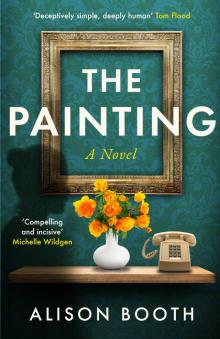 The Painting
The Painting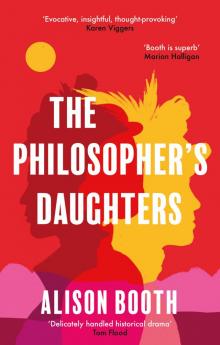 The Philosopher's Daughters
The Philosopher's Daughters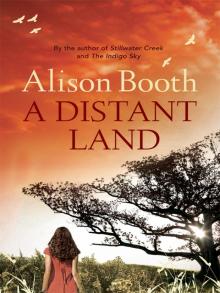 A Distant Land
A Distant Land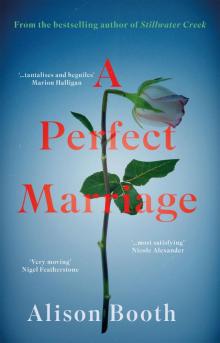 A Perfect Marriage
A Perfect Marriage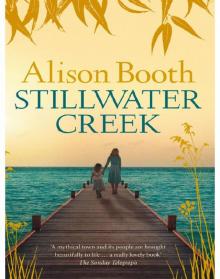 Stillwater Creek
Stillwater Creek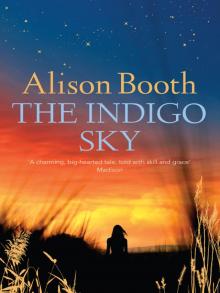 The Indigo Sky
The Indigo Sky